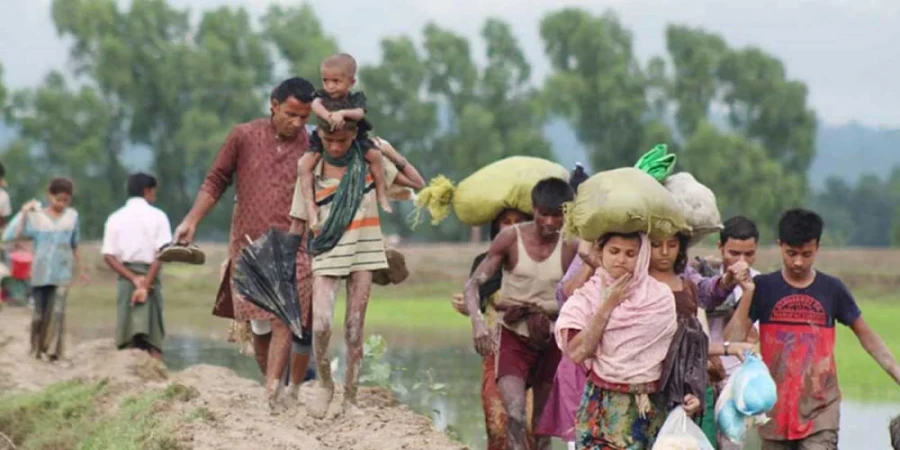
ছবি: File photo
Bangladesh faces a new wave of Rohingya refugees as over 60,000 individuals have entered the country within the last five months, according to official estimates. However, the actual number could be significantly higher. An estimated 100,000 more Rohingya are reportedly waiting at the Myanmar border to cross into Bangladesh, intensifying concerns for border security and humanitarian management.
The situation has become increasingly complex due to the escalating control of the Arakan Army, an armed rebel group, over approximately 270 kilometers of Myanmar’s territory along the Bangladesh border. This includes the strategic capture of Maungdaw, a town adjacent to Bangladesh. These developments have added to the challenges already faced by Bangladesh, which is hosting nearly 1.15 million Rohingya refugees.
Diplomatic Concerns Amid Border Tensions
Experts and analysts have highlighted the urgency of preventing further influxes of Rohingya while maintaining vigilance along the border. The diplomatic relationship between Bangladesh and Myanmar remains strained, compounded by the military junta’s lack of international legitimacy and the rising influence of the Arakan Army.
Analysts emphasize that Bangladesh needs to approach the issue not merely as a bilateral problem with Myanmar but as a Southeast Asian crisis requiring international attention. According to Amina Mohsin, a diplomatic expert, "Bangladesh must strengthen its position in Bay of Bengal geopolitics while maintaining balanced relations with both the Myanmar military and the Arakan Army."
The presence of two factions—the Myanmar junta and the Arakan Army—further complicates repatriation efforts. The Arakan Army's hostile stance towards the Rohingya, coupled with Bangladesh’s historical support for groups opposed to the rebels, has strained potential dialogue between Dhaka and the Arakan Army.
Arakan Army’s Growing Influence
The Arakan Army is currently expanding its control in Rakhine State, fighting for key towns such as Gwa, Taungup, and Ann. Reports indicate that the group has taken over large portions of Ann and more than 30 military bases previously held by Myanmar’s junta.
This territorial expansion by the Arakan Army poses significant risks for regional security, particularly for India’s northeastern states. Experts warn that the instability could spill over into neighboring regions, further complicating the crisis.
Bangladesh’s Diplomatic Balancing Act
Bangladesh’s strategy involves engaging with both the Myanmar junta and the Arakan Army. While the government has yet to officially recognize the rebel group, experts suggest exploring informal channels of communication. Some argue that now is not the right time for formal negotiations with the Arakan Army but stress the importance of keeping all options open.
Parvez Karim Abbasi, an assistant professor at East-West University, noted, "Bangladesh must ensure its military options remain viable while pursuing diplomatic alternatives. Informal channels could be key to managing relations with the Arakan Army without compromising national interests."
Additionally, regional powers such as India and China are also involved in discussions with Myanmar. India, traditionally aligned with the junta, appears to be recalibrating its approach by considering ties with the Arakan Army. Bangladesh must remain attentive to these shifts in regional dynamics to safeguard its strategic interests.
Addressing the Humanitarian Crisis
In light of the latest arrivals, the registration of new Rohingya refugees remains a contentious issue. According to Bangladesh’s Home Affairs Advisor, Lieutenant General (Retd.) Jahangir Alam Chowdhury, "The decision to provide shelter to these new arrivals is yet to be finalized. Border security has been strengthened to prevent further infiltration."
The government has also taken measures to combat human trafficking networks that facilitate illegal crossings. Officials stress that continued dialogue with both the Myanmar government and the Arakan Army is crucial to resolving the crisis.
Meanwhile, Foreign Affairs Advisor M. Touhid Hossain reiterated Bangladesh’s position, stating, "We have informed Myanmar that its borders are no longer under its control. A resolution to the crisis requires Myanmar to address the challenges posed by the Arakan Army."
Regional and International Implications
The Rohingya crisis underscores broader geopolitical concerns in the Bay of Bengal region. Analysts believe that Bangladesh must advocate for international intervention, presenting the crisis as a regional challenge rather than a bilateral issue.
As the new year approaches, the focus remains on preventing further refugee influxes, ensuring border security, and pursuing meaningful diplomatic engagement with all stakeholders to address the protracted Rohingya crisis.
repoter






